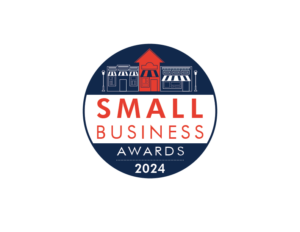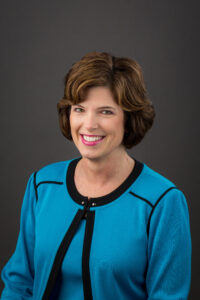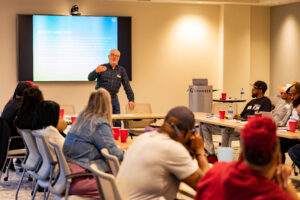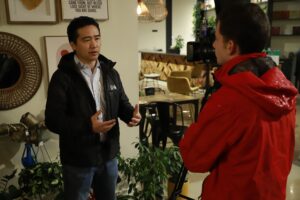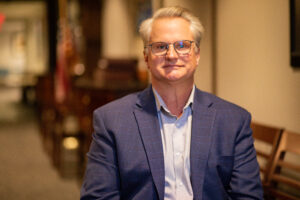vKuhuUbWiR0
The Chattanooga Chamber of Commerce hosted the Economic Outlook Virtual Event on Jan. 12 from 8:30 to 9:30 a.m. via Zoom, featuring David Altig, Ph.D., as our event speaker. Alitig serves as executive vice president and director of research at the Federal Reserve Bank of Atlanta. In addition to advising the Bank president on monetary policy and related matters, Altig oversees the Bank's Research Division, which includes the Bank's team of economists, the Regional Economic Information Network, and the Bank's Community and Economic Development function. In this role, Altig leads the Atlanta Fed's research and engagement portfolio on benefits cliffs and serves as a member of the Bank's Management and Discount Committees.
During this event, Altig spoke about our economic forecast for 2021. Read below for the Zoom interview and click here to watch the event.
Disclaimer: This event was pre-recorded on Jan. 4, eight days before it aired to our members and the general public. The economic forecast may have seen a few changes between the time it was recorded, the time it aired and now.
Altig: This picture is an index of uncertainty that we put together at the Federal Reserve Bank of Atlanta from a survey we do of businesses. This one is done by the Bank of England for the UK. Basically, it's an index constructed from asking businesses their view of the possible outcomes for the next 12 months, or the next four quarters. And the likelihood of those different sorts of outcomes.
You can see that in the spring of this year — March and April in particular — when COVID hit, these indexes jumped dramatically, clearly not just in the United States but all over the world. It's no surprise to anyone that this happened and probably no surprise that it has not abated. This jumping uncertainty is unprecedented, and in most of our memories, these indexes only go back to about 2016. So we miss Brexit for example, and the immediate impact of that, but this period of time saw the trade war, political events like impeachment in the United States — which barely registered in these uncertainty indexes once it's put in the context of the pandemic and the dramatic increase that came with it.

That's just the background for everything I'm going to explain, which amounts to really sort of conceding that nobody knows exactly what's going to happen. These are the numbers that basically represent the consensus view of overall growth in the U.S. economy for the next three years.
Unfortunately, this year is going to look pretty bad. We're going to have a contraction and overall growth that amounts to 3%, despite the fact that the latter part of the year is characterized by not only growth, but very, very rapid growth over 30% in the third quarter, but not enough to overcome the downfall we experienced in the second quarter. Looking forward, the outlook is relatively optimistic: 4% growth next year, which is above trend rate of growth of 2%, which we think is something like about 2% over the next several years. Despite that positive picture, it's in many ways, not quite positive enough to make up for the decline in GDP and the pace of recovery that we needed to get back to where we would've been without the pandemic.

The picture above shows the evolution of the level of GDP over time, according to these forecasts where “100” represents where we were prior to the pandemic at the end of last year. Looking back at my aforementioned outlook, this means that we'll be back to even where we were at the end of 2019 at some point in the middle of next year, if it all pans out as anticipated, which is a much better forecast than we would've seen even a quarter ago. So the good news is, the view of how quickly our economy is going to bounce back has become more optimistic over time. This has partly to do with the impact of the fiscal policy supports, partly with the arrival of the vaccines, and some with the surprising resilience of the U.S. economy.

This information came from the survey of businesses that we first conducted in April, and we asked businesses for their sales projections and growth going forward. Back in April, the worst case scenarios where in the neighborhood of a 20% contraction in sales for the year, and thankfully we're going to be nowhere in that in that range. Right now, the worst case scenario looks like something along the lines of a 5% contraction, which would be severe. And that would be on the upper end of a continuing recession. But nowhere near the depression level scenarios that were being drawn back in the spring. And what's more now is the case that there are some pretty significant upside scenarios that businesses are seeing. So optimism is with us among forecasters and importantly with this among businesses who at the end of the day are the ones that are going to be driving this boat.
Chamber: Heading into this crisis, economic fundamentals were strong. How might that affect the timing and strength of any recovery we see on the other side of this?
Altig: I think one of the reasons the economy bounced back from the pandemic in the way it did is because we were in a good place prior to the pandemic. All of the weaknesses and imbalances that you typically see around the time of recession were absent. Neither consumers nor businesses were overindebted. The government was in a lot of debt, and got into a lot more as a result of this. But we still found ourselves in a good position to be able to supply the kind of support needed to take us from point A to point B, with a lot less difficulty than many of us fear. Thankfully, we entered this thankfully from a position of strength and resilience.
Chamber: You'd mentioned the difficulties of being a prognosticator especially right now with how fluid everything is. Are you in the Fed watching closely for signs of recovery or more stalling out in the economy?
Altig: Oh, for sure. We're always watching for that. And you know, part of it, of course, is that the usual economic forces are not the big picture. The big picture right now is showing us things we have zero expertise in. The policy response to the virus, even from the point of view of monetary policy, is largely out of our control. And I'm thinking about things like shut downs: the decisions to open the economy and at which pace you should do it. So we are, you know, like everyone else in very, very unfamiliar territory. For the most part, the fortunate part has been that the biggest surprises have been positive and not negative as we've traversed through this. The big unknown right now is the vaccine, of course. But I would add that to the upside risk to the economy and not the downside risk. So, that's much better than 8 months ago.
Chamber: You and your staff gather a great deal of information for people on the ground: business owners, nonprofits, civic decision makers; what are you particularly interested in learning from your contacts to Chattanooga right now?
Altig: There are certain parts of the economy — retailers of all sorts — that have taken a very large hit and it's important for us to know whether or not there is likely to be a sharp return to something that feels like normalcy. We're sort of struggling to understand how much of the damage that we've experienced over this year can be repaired quickly and how much cannot. And, you know, it's not just retailers. Of course, if you think about something like commercial real estate — what is remote work going to look like going forward? And what's that going to do to the demand for office space? Those sorts of questions are absolutely critical to us. And it's important for us that we continue to get feedback as we go throughout this year. And in particular, as we contemplate what happens when the economy really begins to open up, the questions become: how fast can we recover? Or how slow are we going to have to suffer through the after effects of the pandemic?
Chamber: I know we've partnered with Atlanta Fed a few times in getting surveys out to our members, which underscores how important it is for folks to respond so we can collect data. I understand that the Atlanta Fed has made improving economic mobility and resilience a major priority. Can you discuss how this unusual downturn is affecting our most vulnerable populations and efforts to address this?
Altig: Yes, the pandemic has disproportionately impacted people in lower wage jobs and really challenged the resilience of individuals to withstand the stress, the financial stress. There's been a lot of policy interventions that have been very helpful: moratoria on evictions and the willingness of financial institutions in help people work through their stress.
The CARES Act, related PPP and fiscal supports were absolutely critical, I believe, in keeping the economy from really falling off the cliff. But those are all short-term and they cannot be sustained forever. So now we're interesting in how we should go about positioning people to have their own resources, moving low-skill workers up the skill ladder to higher paying, more resilient jobs, and continuing to provide opportunities. the thing that we're interested in is how do you position people to have their own with their own resources, whether storms hopefully none like this again but we will see ups and downs in the economy was the ups and downs and individual circumstances. So you know, taking those low skill workers, moving them up the skill ladder to higher paying more resilient jobs and dealing with the aftermath that I mentioned of the last recession with respect to jobs and manufacturing and construction that were lost and continuing to provide opportunities for those sorts of people. You know, that's, that's where the story is going to be written in the longer term, as far as whether or not we can collectively marshall our best thinking to kind of implement successfully those sorts of transitions for people. And our communities absolutely depend upon it.
Chamber: You'd mentioned that we're still dealing with the legacy of the last recession, and that the downstream effects of that are being felt right now. So I think, you know, when we see data like that, that says the unemployment rate is rising. At the Chamber we hear from our members and business owners all the time that they have trouble finding the workers they need right now. How do you reconcile that and what needs to be done to close the gap between employers with job openings that Chattanoogans are actually looking for?
You know, it is paradoxical that you can have a labor shortage while also having a labor surplus. Something for us to address on an ongoing basis is simply the mismatch between the skillset of the labor force and the jobs that are available.
Chamber: This is the million dollar question that you knew I was going to have to ask: what about inflation? Could we see deflation as a result from this crisis? Or might we see inflation as vaccines usher in a recovery and it unleashes pent up demand?
It's a great question. If you look at projections, whether they're coming from the Federal Reserve or whether they're coming from private forecasters, the answer you will get is no, we're not going to see deflation and no, we're not going to see rampant inflation. It is true that in the short run the picture is very, very cloudy. Prices have exhibited some of the strange behavior that the entire economy has exhibited as a result of this crisis.
I think our view from Atlanta is that there's really no particular signals that there is some significant trend in one way or the other in overall prices. There's some possibility of seeing some price pressures as the economy begins to turn to normal, but it's not clear how quickly that will be.
Chamber: Finally, some practical advice, what can we do to make the Chattanooga economy more resilient to future shocks? And is there anything you hope that the policy makers and even the rest of us can learn from this crisis?
Atig: I mean, I think you're doing it. Chattanooga Calling is the perfect example of what must be done. That addresses the question of both mobility and resilience. I don't know what you can do to prepare for something like what we saw this time. So I don't think there's a new formula to be applied and, and much in the way of new lessons, the most powerful engine of growth for any community is its people.

